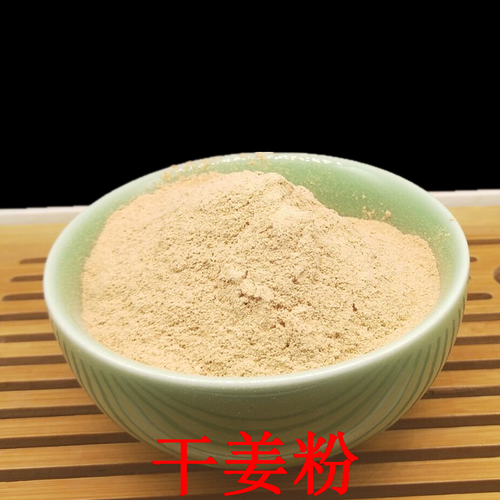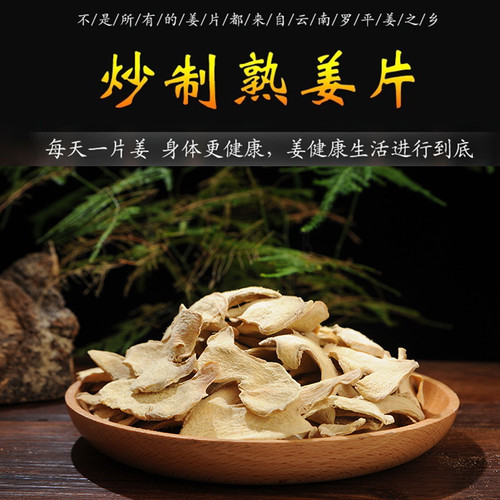Product Overview
Parts used: Dried rhizome
TCM category: Herbs that warm the Interior and/or expel Cold
TCM nature: Hot
TCM taste(s): Pungent
Meridian affinity: Stomach Heart Kidney Lung
Scientific name: Zingiber officinale
Use of dried ginger (Gan Jiang) in TCM
Please note that you should never self-prescribe TCM ingredients. A TCM ingredient is almost never eaten on its own but as part of a formula containing several ingredients that act together. Please consult a professional TCM practitionner, they will be best able to guide you.
Preparation: Remove impurities, wash and soak in water to moisten, cut in thick pieces and dry
Dosage: 3 - 9 grams
Main actions according to TCM*: Warms the Spleen and expels Cold. Restores collapse of Yang and expels Interior Cold. Warms the Lungs and assists expectoration of Cold Phlegm. Stops chronic bleeding caused by Cold.
Primary conditions or symptoms for which dried ginger may be prescribed by TCM doctors*: Abdominal pain Phlegm Vomiting Dyspnea Coughing Diarrhea Asthma Abnormal uterine bleeding
Contraindications*: This herb should not be used by those with Yin Deficiency and Heat signs or bleeding associated with Hot Blood. This herb should be used with extreme caution during pregnancy. May enhance risk of bleeding when ginger is used together with the blood thinning drug Warfarin
Common TCM formulas in which dried ginger are used*:
For Damp-Cold jaundice combine dried ginger with prepared aconite (Zhi Fu Zi), poria-cocos mushrooms (Fu Ling) and virgate wormwood (Yin Chen).
For Cold Stomach and Spleen with abdominal pain, diarrhea and lack of appetite combine dried ginger with cloves (Ding Xiang), atractylodes rhizomes (Bai Shu) and amomum fruits (Sha Ren).
For vomiting and nausea caused by a Cold Stomach combine dried ginger with crow-dipper rhizomes (Ban Xia) and lesser galangal rhizomes (Gao Liang jiang).
For Cold Spleen, Stomach and Kidneys with abdominal pains, lack of appetite and loose stools combine dried ginger with cinnamon bark (Rou Gui), atractylodes rhizomes (Bai Shu), ginseng (Ren Shen) and prepared aconite (Zhi Fu Zi).
For Cold Stagnation in the Liver meridian associated with hernia combine dried ginger with fennel seeds (Xiao Hui Xiang), cinnamon bark (Rou Gui) and costus roots (Mu Xiang).
For symptoms of abdominal pain, nausea and vomiting combine dried ginger with sharp-leaf galangal fruits (Yi Zhi Ren), codonopsis roots (Dang Shen) and atractylodes rhizomes (Bai Shu).
For diarrhea and excessive salivation or drooling caused by Spleen Deficiency combine dried ginger with sharp-leaf galangal fruits (Yi Zhi Ren), codonopsis roots (Dang Shen), poria-cocos mushrooms (Fu Ling) and crow-dipper rhizomes (Ban Xia).
For prolonged menstrual bleeding combine dried ginger with silvery wormwood leaves (Ai Ye).
For abdominal pain combine dried ginger with honey (Feng Mi), white peony roots (Bai Shao), liquorice (Gan Cao) and cinnamon twigs (Gui Zhi).
Key TCM concepts behind dried ginger (Gan Jiang)'s properties
In Traditional Chinese Medicine (TCM), dried ginger are plants that belong to the 'Herbs that warm the Interior and/or expel Cold' category. Herbs in this category are used for Internal Coldness with Qi and Yang Deficiency. In the Yin and Yang system of thought (see our explanation on Yin and Yang) Yang is Hot in nature. A deficiency of Yang will therefore lead to Internal Coldness since there will as a result be more Yin (Cold in nature) than Yang. In extreme cases this can lead to so-called 'Yang collapse' with convulsions or coma and these herbs are particularly indicated to treat such scenarios.
As suggested by its category dried ginger are plants that are Hot in nature. This means that dried ginger typically help people who have too much "cold" in their body. Balance between Yin and Yang is a key health concept in TCM. Those who have too much cold in their body are said to either have a Yin excess (because Yin is Cold in nature) or a Yang deficiency (Yang is Hot in Nature). Depending on your condition dried ginger can help restore a harmonious balance between Yin and Yang.
Dried ginger also taste Pungent. The so-called "five elements" theory in Chinese Medicine states that the taste of TCM ingredients is a key determinant of their action in the body. Pungent ingredients like dried ginger tend to promote the circulations of Qi and body fluids. That's why for instance someone tends to sweat a lot when they eat spicy/pungent food.
The tastes of ingredients in TCM also determine what organs and meridians they target. As such dried ginger are thought to target the Stomach, the Heart, the Kidney and the Lung. In TCM the Stomach is responsible for receiving and ripening ingested food and fluids. It is also tasked with descending the digested elements downwards to the Small Intestine. In addition to regulating blood flow, the Heart is believed to be the store of the "spirit" which basically refers to someone's vitality. The Kidneys do not only regulate the urinary system but also play a key role in the reproductive system and the growth and aging process of the body. In addition to performing respiration, the Lungs are thought to be a key part of the production chain for Qi and the body fluids that nourish the body.
Use of dried ginger (Gan Jiang) as food
Dried ginger are also eaten as food. It is used as an ingredient in dishes such as Candied ginger or Gingerbread.









